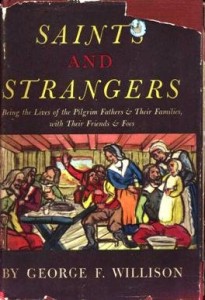
Author: Willison, George F.
Genre: History
Tags: Baptist / Baptists, History / Story / Narrative
Series:
Rick Shrader‘s Review:
I have owned a copy of this 1945 history book for a number of years but had not read it until this Thanksgiving season. Born in Colorado, Willison (1896-1972) specialized in American history. He even wrote the CliffsNotes for The Federalist and also for Pilgrim’s Progress. Sometimes it is hard to read a lengthy history book (this being about 450 pages) just for fun, but this can easily be the exception. Willison traces the history of the Pilgrims, known only as Separatists and sometimes as Brownists (a name taken from the separatist Robert Browne), from their retreat to Scrooby, England, to their further retreat in Leydon, Holland, to finally their removal to America. His historical notes are based mostly on William Bradford’s Of Plymouth Plantation, which traces their history throughout the first half of the seventeenth century (1606-1647), the main and endearing characters being Bradford, William Brewster Edward Winslow, and Captain Miles Standish. In addition are helpful descriptions of Baptists John Smyth, Roger Williams, and the American Indians Squanto and Samoset. “Saints” refers to the believing Pilgrims, and “Strangers” refers to others who came.
Willison, in keeping with Bradford’s journal, doesn’t pull any punches in describing the good and not so good of the Pilgrim history. Yet the overall picture is overwhelmingly encouraging and uplifting. Our modest problems today are insignificant and anemic compared to what those early settlers on our shores endured. The Pilgrims were separatists who could no longer worship under the Church of England. They were not Puritans who tolerated the Church more, and they were not Baptists who never were Anglicans nor borrowed their mixture of church and state. Plymouth Plantation was a harsh, poor, but proud town whose religious fervor lasted about a generation. In the end they were blended into the Puritan culture of Massachusetts whose city of Boston outgrew Plymouth by leaps and bounds. The Baptists under Roger Williams resisted the church-state concept of the Puritans and were driven further west where they established a freer church and the state of Rhode Island. Regardless, any of those original settlers would be blatant conservatives today. Near the end of the book, Willison quotes Bradford describing Plymouth when the original Mayflower group was almost gone, “And thus was this poore church left like an anciente mother, growne olde, and forsaken of her children, (though not in their affections), yett in regarde of their bodily presence and personall helpfullness. Her anciente members being, most of them, worne away by death and these of later time being like children translated into other families, and she like a widow left only to trust in God. Thus she that had made many rich became herselfe poore.”
